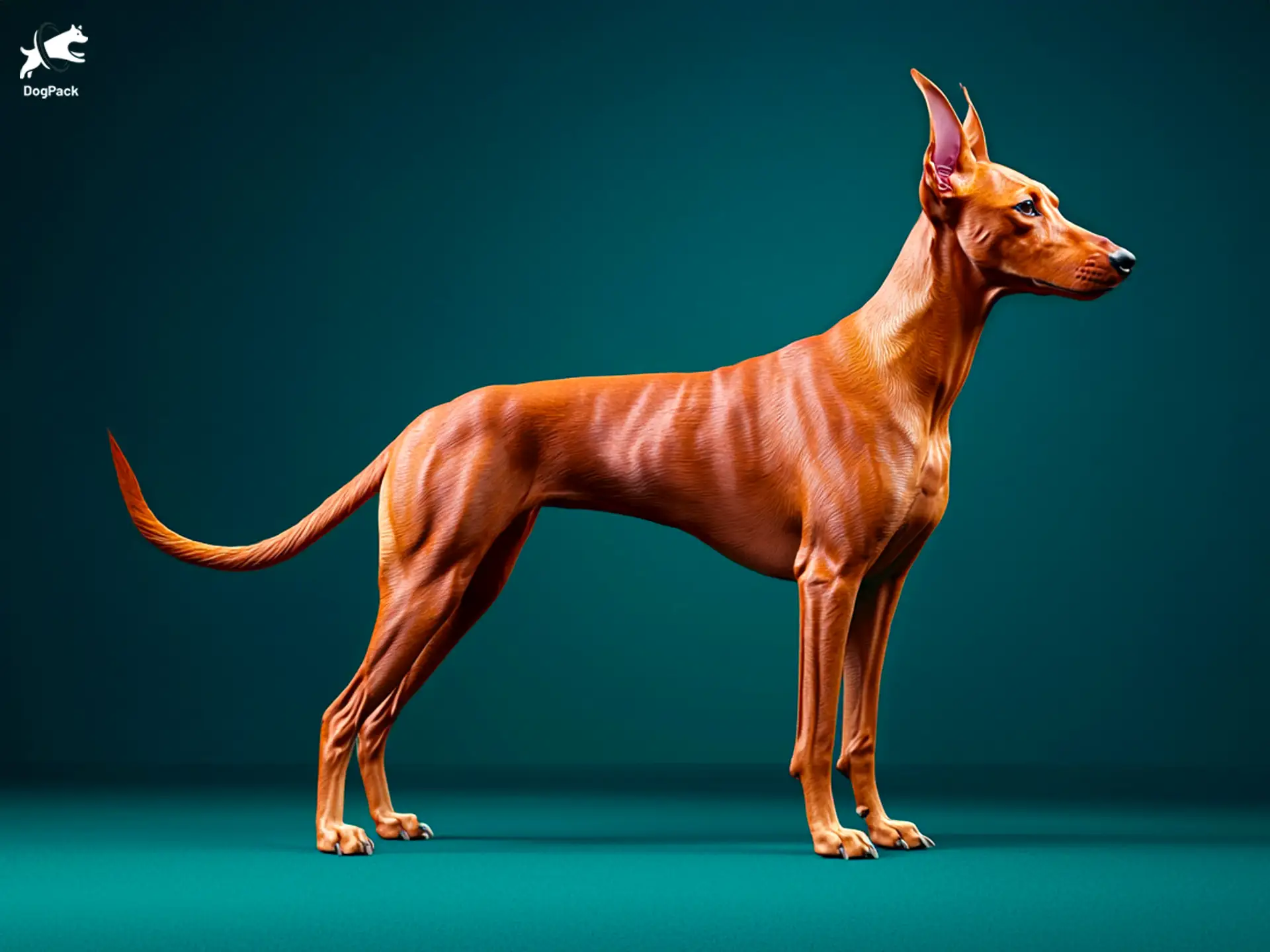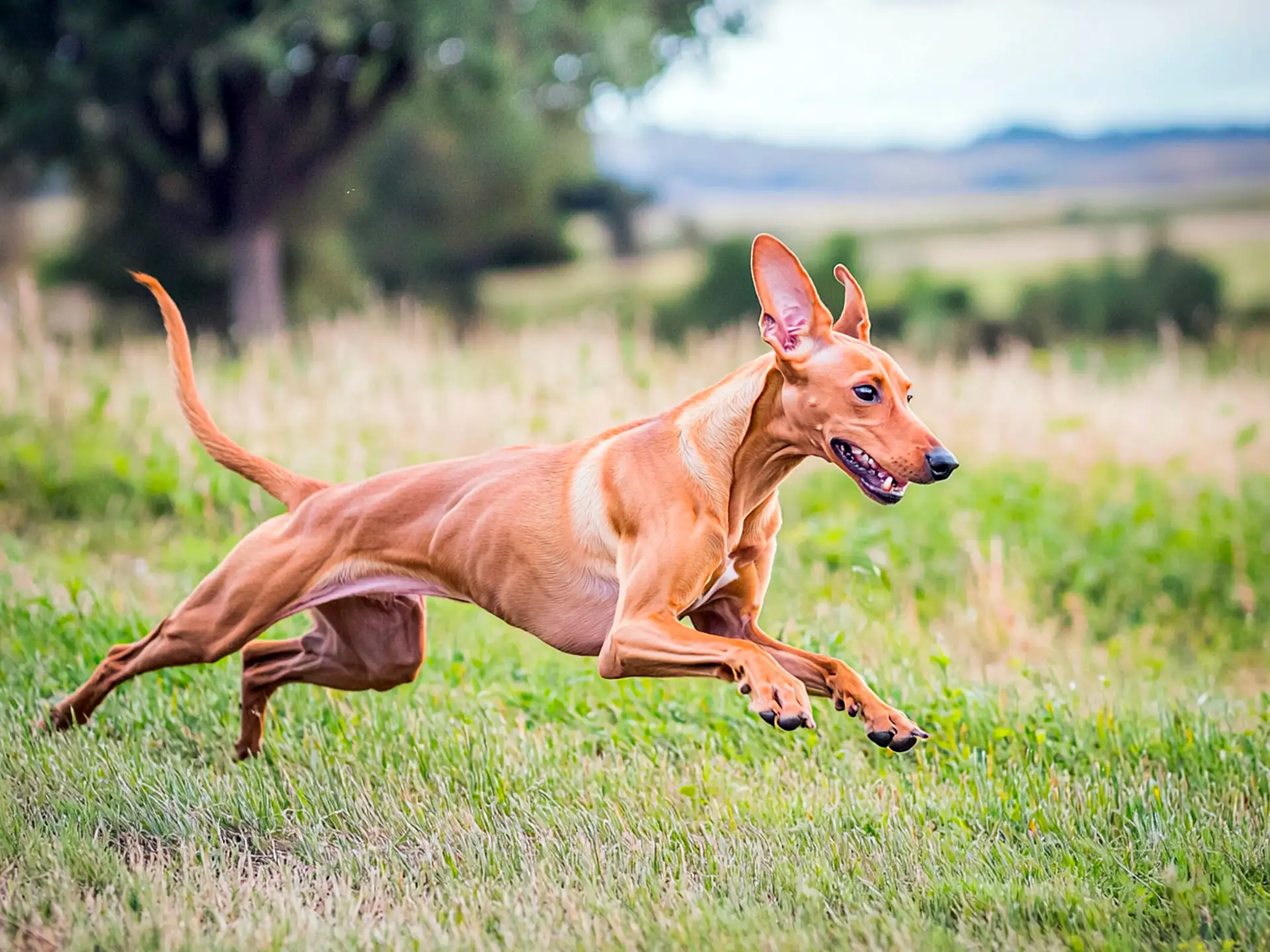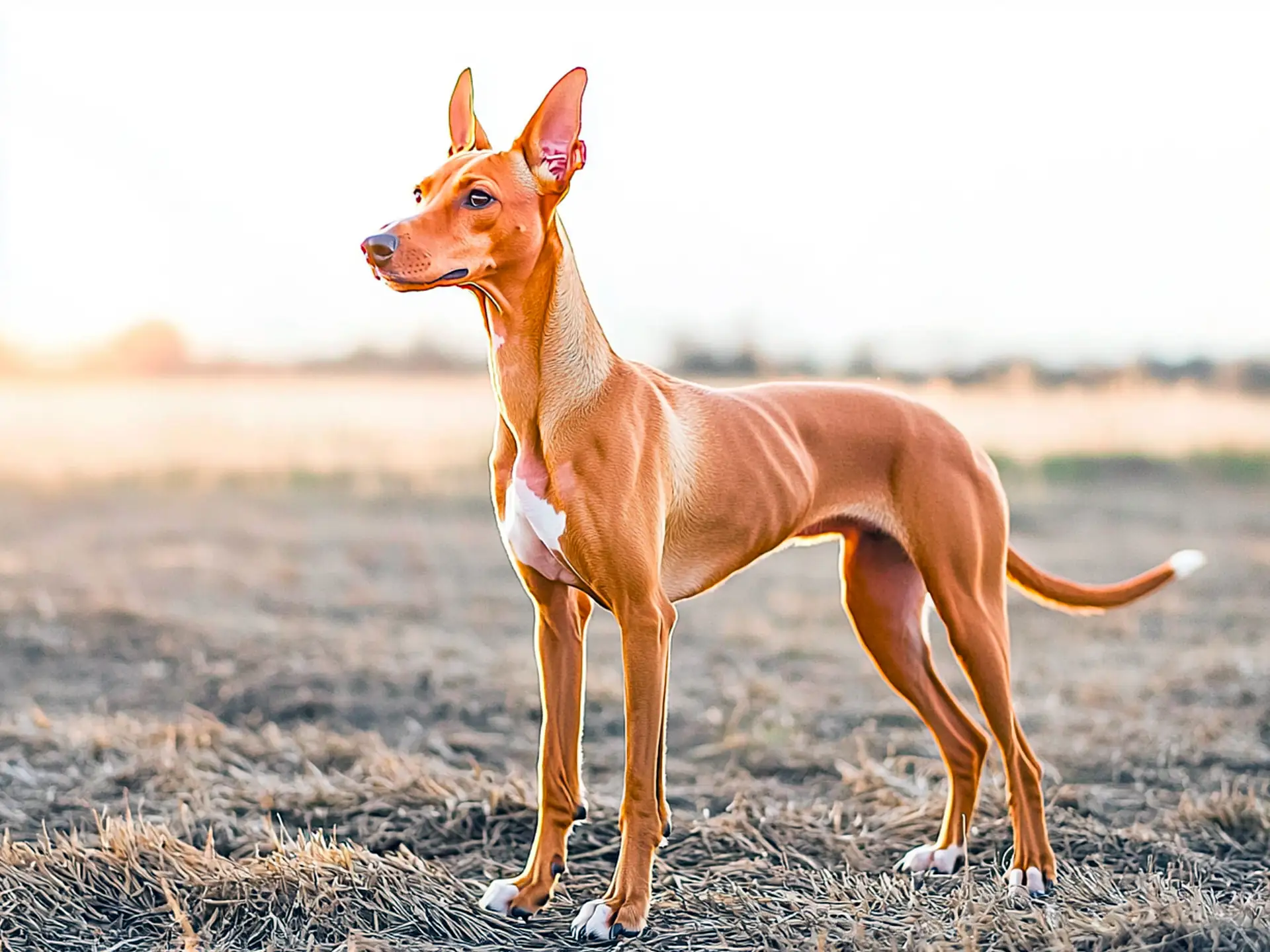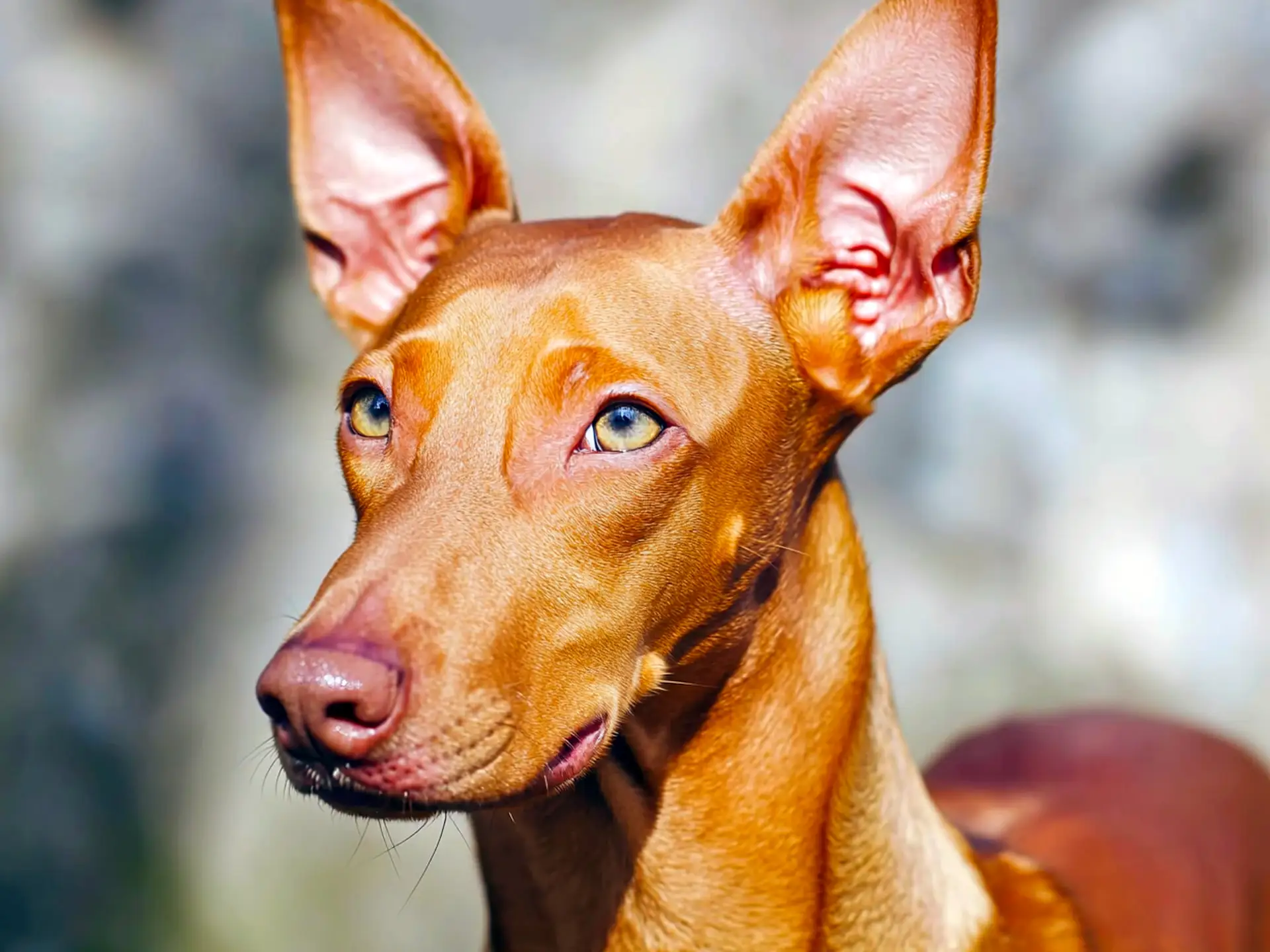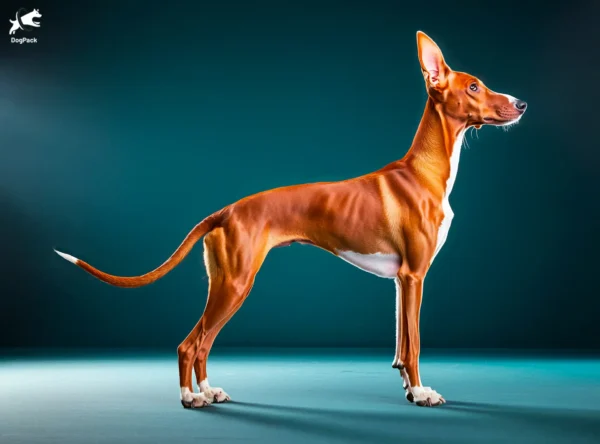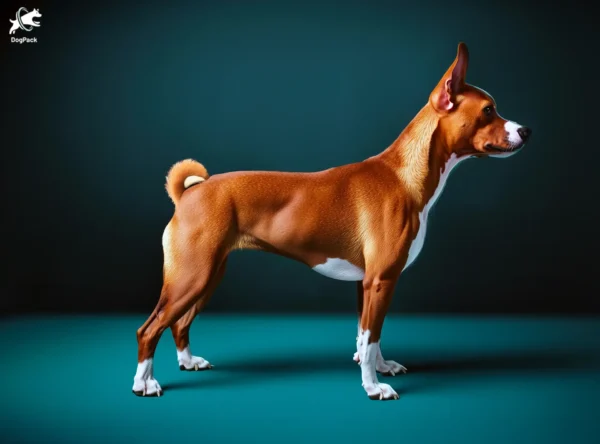Pharaoh Hound Dog Breed Info & Overview
The Pharaoh Hound, an ancient and elegant breed from Malta, is as unique as it is captivating. Known for their ability to “blush” and their regal appearance, these dogs combine a playful nature with sharp hunting instincts. Affectionate and loyal, Pharaoh Hounds make spirited companions and loving family pets, bringing a perfect mix of grace and warmth to any home.
Characteristics
Pictures
Breed History
Believe it or not, the Pharaoh Hound isn’t actually from Egypt, despite the name suggesting otherwise. This breed hails from the Mediterranean island of Malta, where it’s been a beloved companion and skilled hunter for centuries. The Maltese name “Kelb tal-Fenek” translates to “Rabbit Dog,” highlighting their prowess in hunting rabbits.
Historical artifacts and artwork depict dogs resembling the Pharaoh Hound in ancient Egyptian tombs, which adds to the mystique surrounding them. It’s thought that Phoenician traders brought the ancestors of these dogs to Malta, where they evolved into the breed we know today. Their elegant appearance certainly evokes images of ancient nobility.
In the 20th century, the breed caught the eye of dog enthusiasts outside Malta, leading to their introduction in the United Kingdom and later the United States. The Pharaoh Hound was officially recognized by the American Kennel Club in 1983, and since then, they’ve charmed many with their unique looks and engaging personalities.
Temperament, Personality
Pharaoh Hounds are known for their affectionate and friendly nature, making them delightful companions. They’re intelligent and have a playful streak that can keep you entertained for hours. However, don’t be surprised if they exhibit a bit of independence—that’s just part of their charm.
When it comes to children, they generally do well, especially if they’re raised together. Their energetic nature makes them great playmates for older kids who can match their enthusiasm. Just remember, early socialization is key to fostering a harmonious relationship.
As for other pets, their high prey drive might pose a challenge. Pharaoh Hounds have a natural instinct to chase smaller animals, so caution is advised if you have cats or small pets. With proper introductions and training, they can learn to coexist peacefully, but supervision is always recommended.
Physical Characteristics
One glance at a Pharaoh Hound, and you’ll notice their sleek, athletic build and graceful lines. They possess a short, glossy coat that comes in shades of tan or chestnut, sometimes with white markings on the chest, toes, or tail tip. Their coat requires minimal grooming, which is a bonus.
Perhaps the most distinctive feature is their large, upright ears that are highly expressive. Fun fact: when excited, Pharaoh Hounds can actually blush, with their nose and ears turning a rosy hue! This endearing trait adds to their unique appeal.
Standing between 21 and 25 inches tall and weighing around 40 to 60 pounds, they are considered medium-sized dogs. Their eyes are a striking amber color, harmonizing beautifully with their coat. Overall, they exude an air of elegance and athleticism that’s hard to miss.
Health Issues
Generally, Pharaoh Hounds are a healthy breed with few genetic health problems. However, like all breeds, they’re prone to certain conditions. One such issue is hip dysplasia, a hereditary condition that affects the hip joints. Regular veterinary check-ups can help in early detection and management.
Another concern is sensitivity to anesthesia due to their lean body mass. It’s crucial to inform your vet of this sensitivity if your Pharaoh Hound requires surgery. Additionally, they can be susceptible to allergies, particularly skin allergies, which may require dietary adjustments or medications.
Maintaining a balanced diet and ensuring they get plenty of exercise can contribute to a long, healthy life. Regular dental care is also important, as dental issues can lead to other health complications. Always consult with a veterinarian familiar with the breed for tailored health advice.
Grooming Needs
If you’re not a fan of extensive grooming routines, the Pharaoh Hound might just win you over. Their short, fine coat requires minimal maintenance. A weekly brush with a soft bristle brush or grooming mitt is usually sufficient to keep their coat looking sleek and healthy.
Bathing isn’t needed frequently unless they’ve gotten into something messy. Their skin can be sensitive, so it’s advisable to use a gentle dog shampoo to avoid irritation. Regular checks for skin issues or allergies can help catch any problems early on.
Don’t forget about nail care and dental hygiene. Trim their nails regularly to prevent overgrowth, which can be uncomfortable. Brushing their teeth a few times a week will help maintain good oral health. Overall, grooming a Pharaoh Hound is relatively low-effort, making them an excellent choice for busy owners.
Exercise Requirements
Bursting with energy, the Pharaoh Hound thrives on daily exercise. At least an hour of vigorous activity is recommended to keep them physically and mentally stimulated. They excel in activities like agility training, lure coursing, and of course, a good old-fashioned game of fetch.
A securely fenced yard is essential, as these hounds are swift runners with a keen eye for anything that moves. Remember, their hunting instincts are strong, so off-leash play should only occur in safe, enclosed areas. Regular walks combined with playtime can help channel their energy positively.
Mental stimulation is just as important. Puzzle toys, training sessions, and interactive games can prevent boredom, which might otherwise lead to unwanted behaviors. If you’re an active person who enjoys outdoor adventures, a Pharaoh Hound could be your perfect companion.
Training Tips
Training a Pharaoh Hound can be both rewarding and occasionally challenging. They’re intelligent and eager to please but can also be independent thinkers. Positive reinforcement techniques work best, using treats and praise to motivate them during training sessions.
Consistency is key with this breed. Short, engaging training sessions will hold their attention better than longer ones. Early socialization is crucial to help them become well-adjusted adults. Exposing them to different people, environments, and other animals can curb any potential aloofness or timidness.
One challenge might be their strong prey drive. Teaching a reliable recall command is essential, though keep in mind that even a well-trained Pharaoh Hound might be tempted to chase after a squirrel. Patience and understanding of their instincts will go a long way in effective training.
Nutrition, Diet
Feeding a Pharaoh Hound requires attention to their high energy levels and lean physique. They do best on a high-quality, high-protein diet that supports their active lifestyle. Look for dog foods that list meat as the first ingredient and avoid fillers that offer little nutritional value.
Portion control is important to maintain their sleek form. Typically, an adult Pharaoh Hound will consume between 2 to 3 cups of dry food per day, divided into two meals. However, the exact amount can vary based on their age, weight, and activity level, so it’s wise to consult your veterinarian for personalized advice.
Some Pharaoh Hounds may be prone to food sensitivities or allergies, particularly grains or certain proteins. Monitoring their reaction to different foods and possibly incorporating a limited-ingredient diet can help manage these issues. Always introduce new foods gradually to avoid digestive upsets.
Adoption, Breeders
Given their rarity, finding a Pharaoh Hound may require some patience. Reaching out to the Pharaoh Hound Club of America is a great starting point. They can provide referrals to reputable breeders who adhere to ethical breeding practices and prioritize the health and temperament of their dogs.
Adoption is also an option, though Pharaoh Hounds are less commonly found in shelters. Organizations like Pharaoh Hound Club of America Rescue occasionally have dogs in need of a forever home. Adopting a rescue can be a rewarding experience and gives a dog a second chance at a happy life.
When selecting a breeder, ask about health clearances and meet the puppy’s parents if possible. This can give you insight into the potential temperament and health of your future companion. Be wary of breeders who can’t provide proper documentation or who seem more interested in profit than the welfare of their dogs.
Family Pet?
Pharaoh Hounds can make wonderful family pets, especially for active households. Their playful and affectionate nature means they often form strong bonds with their human family members. They enjoy being part of family activities and can be quite the entertainers with their antics.
With children, they are generally patient and gentle, particularly with those who respect their space and energy levels. Supervision is recommended with younger kids to ensure interactions remain positive for both the dog and the child. Their energetic demeanor matches well with older children who can participate in playtime.
Other pets can be a bit tricky due to the Pharaoh Hound’s high prey drive. While they may coexist peacefully with other dogs, smaller animals like cats or rabbits might trigger their hunting instincts. Early socialization and controlled introductions are essential if you have other pets at home.
Right For You?
Considering adding a Pharaoh Hound to your family? This breed thrives in active households where they receive plenty of physical and mental stimulation. If you enjoy outdoor activities and have the time to dedicate to their exercise needs, they could be a fantastic match.
Apartment living might not be ideal for a Pharaoh Hound due to their energy levels and love for open spaces. A home with a securely fenced yard allows them the freedom to run and play safely. Keep in mind that they can be sensitive to cold temperatures, so adequate shelter and warmth are important.
If you’re prepared to invest time in training and socialization, and can offer a loving, engaging environment, the Pharaoh Hound may be the companion you’ve been searching for. Their unique blend of elegance, intelligence, and affection makes them a rewarding breed for the right owner.
Conclusion
Bringing a Pharaoh Hound into your life can be an enriching experience filled with love, laughter, and plenty of activity. This breed offers a unique combination of ancient elegance and playful charm that captivates the hearts of many. They’re best suited for owners who appreciate their spirited nature and can meet their exercise and companionship needs.
While they may present some challenges, such as a strong prey drive and a need for consistent training, the rewards are well worth it. If you’re an active individual or family looking for a loyal and entertaining canine companion, the Pharaoh Hound might just be your perfect match. After all, who wouldn’t want a dog that can make you smile and blush right along with them?
FAQs
-
Why do Pharaoh Hounds have such a strong prey drive?
Pharaoh Hounds were originally bred for hunting in open landscapes, where their speed and vision were key to chasing rabbits and other small game. This heritage contributes to their strong prey drive, making training and secure environments essential.
-
Can Pharaoh Hounds adjust to living in colder climates?
While Pharaoh Hounds are naturally suited to warm climates, they can adapt to colder environments with proper care. Using coats or sweaters during walks and limiting outdoor time in extreme cold can keep them comfortable in lower temperatures.
-
Do Pharaoh Hounds have any unique exercise needs?
Pharaoh Hounds thrive on activities that challenge their speed and agility, such as lure coursing or sprinting in secure areas. These dogs enjoy running freely, so regular high-energy play sessions are ideal to meet their exercise requirements.
-
Are Pharaoh Hounds prone to specific health concerns?
Pharaoh Hounds are generally healthy but may be prone to minor issues like food allergies or sensitivities to anesthesia. Regular vet check-ups and a high-quality diet help mitigate potential concerns for this breed.
-
How do Pharaoh Hounds behave when left alone?
Pharaoh Hounds are independent but can become bored or destructive when left alone for long periods. Providing puzzle toys and mental stimulation can help keep them occupied and prevent separation anxiety.
Breed Ratings
Pharaoh Hounds are smart and quick learners but can be independent, requiring consistent training methods.
This breed loves to play and can be quite entertaining with their lively antics and sense of humor.
High energy levels mean they need plenty of physical activity to keep them content and well-behaved.
They shed minimally, making them relatively low-maintenance in terms of hair around the home.
With a strong instinct to chase, they may not be suited for homes with small pets like cats or rabbits.
Their short coat is easy to care for, requiring minimal grooming to keep them looking their best.
While intelligent, they can be stubborn; patience and positive reinforcement are essential in training.
Pharaoh Hounds prefer company and may become bored or anxious if left alone for long periods.
They are generally quiet but may bark when excited or if they detect something unusual.
This breed drools very little, if at all, which is a plus for tidy households.
Typically sociable with other dogs, especially when properly socialized from a young age.
Generally healthy with few genetic issues, but regular vet care is important to maintain well-being.

